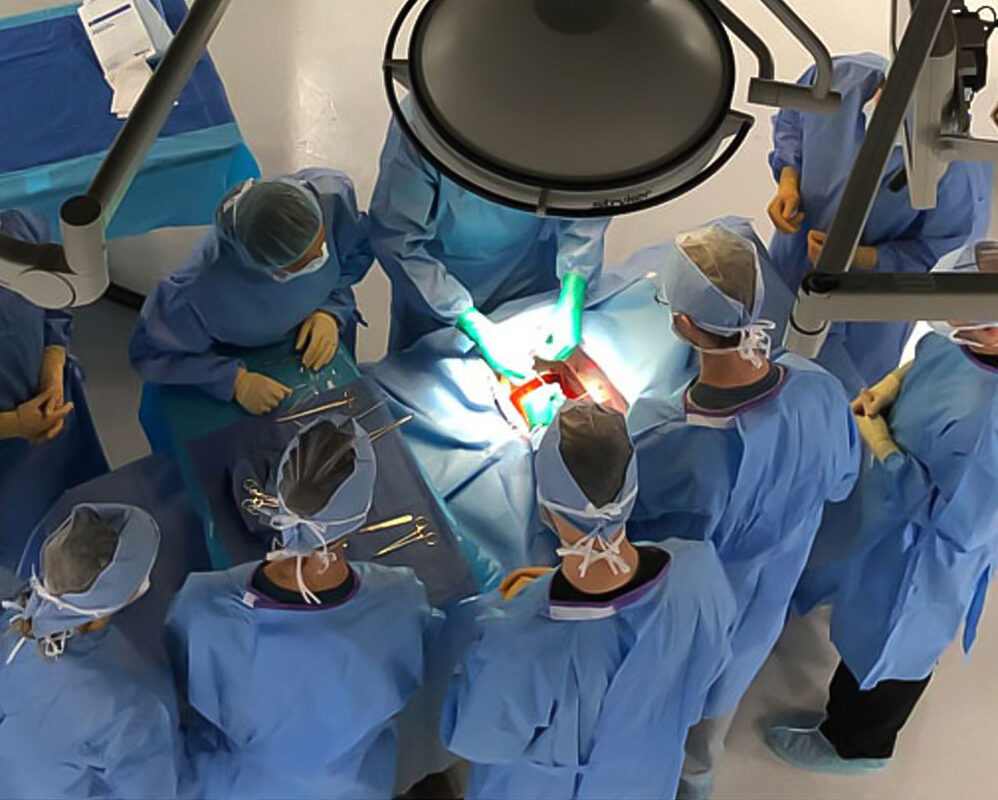QUICK LINKS:
- Program Goal #1 (A3.12b)
- Program Goal #2 (A3.12b)
- Program Goal #3 (A3.12b)
- Program Goal #4 (A3.12b)
- Program Competencies (A3.12g)
- Accreditation (A3.12a, D1.02c)
Mission
The Mission of PA Medicine is to develop highly qualified PAs that embrace servant leadership and provide culturally competent care.
PA Program Goals
For our graduates to obtain this mission, we look to:
Program Goal #1
Excellence: PA Medicine aims to recruit, support, and retain highly qualified students.
Outcome Measure 1: Application Statistics
Benchmark: Application metrics (GPAs, GREs, Direct Patient Care Hours) at or above national averages.
Outcome Measure 2: Student Satisfaction with Support Services
Benchmark: >3.5 on a 5-point Likert Scale
Outcome Measure 3: Graduation Rate
Benchmark: Graduation rate at or above the national average of 94.1% (PAEA Program Report 36).
Results will be published upon graduation of our first cohort.
Results
Results will be published upon graduation of our first cohort.
Program Goal #2
Competence: PA Medicine strives to provide a curriculum and experiences that create competent entry-level PAs.
Outcome Measure 1: Physician Assistant National Certifying Exam (PANCE) First-Time Taker Pass Rates
Benchmark: PANCE 1st time pass rate of 90% or higher per graduating cohort.
Outcome Measure 2: Summative Evaluation 1st Time Pass Rate
Benchmark: 1st time pass rate >90%
Outcome Measure 3: Graduate Exit Survey
Benchmark: >3.5 on a 5-point Likert Scale
Outcome Measure 4: Faculty Survey
Benchmark: >3.5 on a 5-point Likert Scale
Results will be published upon graduation of our first cohort.
Results
Results will be published upon graduation of our first cohort.
Program Goal #3
Versatility: PA Medicine seeks to equip students to provide culturally competent care within various patient populations
Outcome Measure 1: Graduate Exit Survey
Benchmark: >3.5 on a 5-point Likert Scale
Outcome Measure 2: Faculty Survey
Benchmark: >3.5 on a 5-point Likert Scale
Outcome Measure 3: Clinical Rotations in Diverse and Underserved Settings
Benchmark: 100% of students complete at least two such rotations.
Results will be published upon graduation of our first cohort.
Results
Results will be published upon graduation of our first cohort.
Program Goal #4
Leadership: PA Medicine seeks to equip students to provide opportunities to serve the community, demonstrating leadership and professionalism.
Outcome Measure 1: Student Engagement in Community Service
Benchmark: Cohort average of 10 hours per student before graduation.
Outcome Measure 2: Leadership Positions in Organizations or Community Groups
Benchmark: > 25% of students hold at least one leadership role.
Outcome Measure 3: Graduate Exit Survey
Benchmark: >3.5 on a 5-point Likert Scale
Results will be published upon graduation of our first cohort.
Results
Results will be published upon graduation of our first cohort.
Program Competencies (A3.12g)
The competencies of PA Medicine are grounded in the program’s mission and goals and align with the Physician Assistant Competencies, which were collaboratively developed by the American Academy of Physician Assistants (AAPA), the PAEA, the National Commission on Certification of Physician Assistants (NCCPA), and the Accreditation Review Commission on Education for the Physician Assistant (ARC-PA).
These competencies serve as a foundation for curriculum development and are used to evaluate the program’s effectiveness and the success of its graduates. Upon completing the PA Medicine program, graduates are expected to have mastered the following competencies:
PROGRAM COMPETENCIES
Competency 1: Demonstrate the acquisition of medical knowledge required to practice as an entry-level PA.
Competency 2: Gather a history and perform a physical examination.
Competency 3: Prioritize a differential diagnosis following a clinical encounter.
Competency 4: Recommend and interpret common diagnostic and screening tests.
Competency 5: Formulate appropriate clinical management plans.
Competency 6: Report and communicate clinical information effectively in an organized manner.
Competency 7: Provide appropriate patient education in a clinical encounter.
Competency 8: Utilize evidence-based clinical reasoning and problem-solving in patient care.
Competency 9: Provide appropriate referral to other members of an interprofessional team.
Competency 10: Perform general skills/ procedures required of an entry-level PA.
Competency 11: Provide culturally competent care as an entry-level PA.
Competency 12: Demonstrate professionalism required to practice as an entry-level PA.
Accreditation (A3.12a, D1.02c)
The ARC-PA has granted Accreditation-Provisional status to the Palm Beach Atlantic Physician Assistant Program sponsored by Palm Beach Atlantic University.
Accreditation-Provisional is an accreditation status granted when the plans and resource allocation, if fully implemented as planned, of a proposed program that has not yet enrolled students appear to demonstrate the program’s ability to meet the ARC-PA Standards or when a program holding Accreditation-Provisional status appears to demonstrate continued progress in complying with the Standards as it prepares for the graduation of the first class (cohort) of students.
Accreditation-Provisional does not ensure any subsequent accreditation status. It is limited to no more than five years from matriculation of the first class.
The program’s accreditation history can be viewed on the ARC-PA website at https://www.arc-pa.org/accreditation-palm-beach-atlantic-university/.
